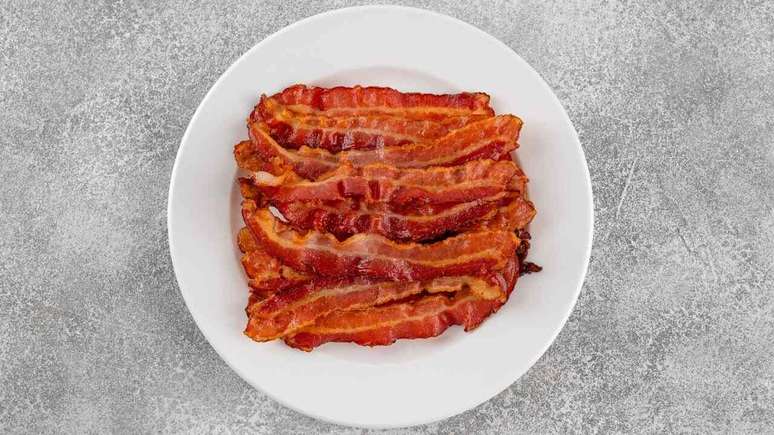Although it is considered a processed meat with carcinogenic potential, bacon can be consumed in a balanced way
Bacon is a food that is present in many recipes, from hamburgers to some desserts. Rich in flavor, it is also a source of fat and calories, so it is seen as bad for health and diet, but it does not have to be that way.
According to Dr. Rodrigo Schröder, bacon is a source of saturated fat, which is associated with increased LDL cholesterol, which is considered harmful to the body. “Excess saturated fat can lead to problems such as atherosclerosis, insulin resistance, and chronic inflammation, all of which are risk factors for heart and metabolic disease,” he explains.
However, saturated fats aren’t just bad. “Although they’re often considered harmful, they do have a functional role in the body, including maintaining cell integrity and producing certain hormones. It’s essential that the rest of your diet is rich in vegetables, fruits, whole grains, and protein sources, which tend to counteract potential negative effects.”
Carcinogenic food
Classified as a processed meat, bacon also gets into another problem: the International Agency for Research on Cancer (IARC), a division of the World Health Organization (WHO), lists processed meat as “carcinogenic to humans” (Group 1), based on sufficient evidence that its consumption causes cancer.
“However, it is important to contextualize that the ‘bad’ is not the food in isolation, but the eating pattern as a whole,” says the doctor. “Bacon can be included occasionally in a balanced diet, but should be consumed in moderation and as an exception, possibly avoiding frequency. I recommend limiting consumption to once or twice a month at most.”
Ideal preparation method
According to Schröder, to minimize the risks, bacon should be cooked at a moderate temperature, “this prevents the formation of potentially carcinogenic compounds that can form when meat is cooked at high temperatures.” It is also advisable to drain off excess fat, avoid the use of additional oil, and, if possible, opt for organic bacon.
Despite the harms, this delicacy also has its positive health side. “It provides protein, B vitamins (such as B1, B2, B3, B6, and B12), and minerals such as phosphorus, zinc, and iron. These nutrients are important for several bodily functions, including energy production, immune function, and the formation of red blood cells,” the doctor concludes.
Source: Terra
Ben Stock is a lifestyle journalist and author at Gossipify. He writes about topics such as health, wellness, travel, food and home decor. He provides practical advice and inspiration to improve well-being, keeps readers up to date with latest lifestyle news and trends, known for his engaging writing style, in-depth analysis and unique perspectives.





![Un Si Grand Soleil Preview: Episode Summary for Tuesday, October 21, 2025 [SPOILERS] Un Si Grand Soleil Preview: Episode Summary for Tuesday, October 21, 2025 [SPOILERS]](https://fr.web.img4.acsta.net/img/c7/7f/c77f5c02e3632e8e611d5041c2b9f36e.jpg)



